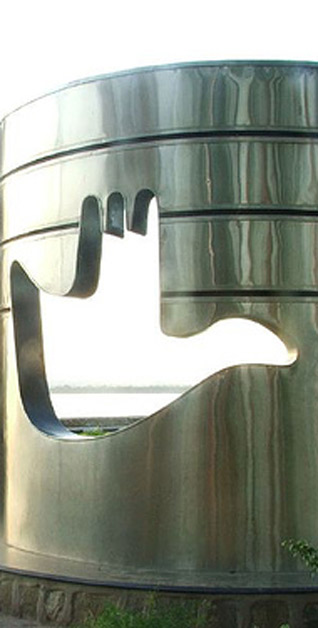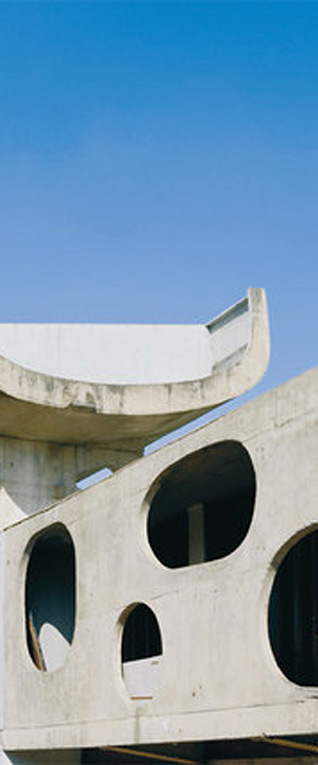Architecture
Chandigarh, The Wonder City of Punjab:
There's Nothing Like It Anywhere Else in India
ANALJIT SINGH
"A city unmatched in economic development, cleanliness, civil order, infrastructure, safety and civic amenities ..."
Our company, Max India, started its journey in 1985 when we set up India's first FDA-approved plant to manufacture a vital drug intermediate of penicillin in Railmajra, Punjab -- around 40 km from the state's capital, Chandigarh.
That was the time when my wife, two children and I lived in a rented accommodation in the city. As a young couple, we found the city very suitable for the upbringing of our children. The planning and aesthetics were in stark contrast to the commotion and political violence that reverberated in India in the 1980s, especially in north India. My children Piya and Veer, barely three and two years old then, would look forward to the weekend drive uphill to Kasauli and strolls along Sukhna Lake.
This is
why when we got a chance, we purchased a house in Chandigarh at one of
the finest locations in the city, virtually on the lake, in Sector 5.
The
Chandigarh of today is different from what it was in the '80s. Economic
growth and political stability have ensured that today it is a seamless
tri-city comprising Panchkula, the Union Territory of Chandigarh and
Mohali.
In Mohali, Max Group has a significant presence in the form of
Max Super Speciality Hospital in Phase IV and Max Institute of
Healthcare at the Indian School of Business (ISB) campus. Max Speciality
Films (MSF) has a plant at Railmajra, with an administrative office in
Sector 8.
It is good to see that all three governments - Union
Territory, Punjab and Haryana -- are making efforts to develop this region of Punjabd
and harness its strong advantages of a large young, educated population
and strong infrastructure.
Punjab government, for example, was aware of the lack of quality healthcare and educational institutions in the region and acted with alacrity when the Prime Minister proposed setting up a Premier Management Institute (PMI) in Mohali's Knowledge City.
In September 2007, I received a letter from Ramesh Inder Singh, then chief secretary of Punjab, inviting me to meet TKA Nair, principal secretary, PMO. He said that the Government was looking to partner with a top management institute and leading industrial houses to set up a world-class management institute. Things moved quickly and in November 2012, ISB Mohali campus was formally inaugurated by the Union finance minister. Max Institute of Healthcare is one of the four partner institutes at the Mohali campus.
With an international airport coming up, improving connectivity and young demographics, I feel bullish about Chandigarh's prospects. But I must add certain caveats.
Economic development, if not backed by proper town planning and public policy, can lead to massive disarrays. Already, Chandigarh's infrastructure is being stretched to the limit. It was a town planned for a 500,000 people in the 1950s; today it is home to more that 1 million.
I have often heard people saying that the
Chandigarh of today is like Bangalore of early 1990s when the garden
city was on the cusp of the IT revolution. While the quality of
technology services that Bangalore offered earned it the sobriquet of
Silicon Valley of India, its inadequate infrastructure and lack of town
planning, where software campuses existed among potholed and jammed
roads, was hardly Californian.
While the authorities can look at
Bangalore and ensure that the same mistakes are not committed,
Chandigarh, in my opinion, should find inspiration from Singapore. In
his remarkable memoir, From Third World to First, Singapore's first
prime minister Lee Kuan Yew describes how rapid economic development
took place in consonance with consistent improvement in life standards,
safety and infrastructure of this model city state.
I sincerely
hope that in a few years, when india today conducts the survey of
India's best cities again, Chandigarh will once again emerge as one of
the leading contenders with the title of "Singapore of India", a city
unmatched in economic development, cleanliness, civil order,
infrastructure, safety and civic amenities or as originally envisaged, a city that is "unfettered by
traditions of past and is a symbol of India's faith in future".
The author is founder & Chairman of Max India. He is also a dancer and writer.
[Courtesy: India Today. Edited for sikhchic.com]
February 25, 2013
Conversation about this article
1: Baldev Singh (Bradford, United Kingdom), February 25, 2013, 9:40 AM.
Can anyone imagine what Chandigarh or indeed other cities in Punjab would be like if Sikhs would be solely in charge, and not have the desis meddling in their affairs merely because their numbers are greater ? A thousand times more successful than the mess that India is in today.
2: R Singh (Canada), February 26, 2013, 7:19 AM.
Why is everybody insisting upon not using the real Name of the city "Ajitgarh", named after Sahibzada Ajit Singh, but continue with Mohali, which used to be a small village. There is no need to forget the villages, instead the ridiculously names chowks and margs, they can be named after villages to be commemorated. There was no problem with name changes elsewhere, whereas this city was 'Sahibzada Ajit Singh Nagar' to begin with, now appropriately shortened to Ajitgarh, still one sees no signeage changes or any reference to it as an internationally known cricket stadium. Can the Punjab government wake up?




